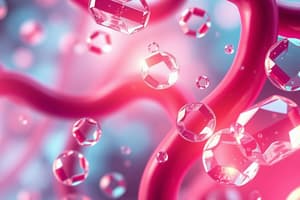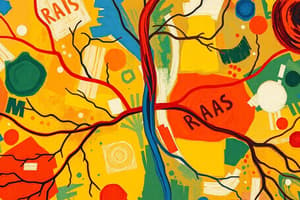Podcast
Questions and Answers
What is the primary characteristic that distinguishes essential hypertension from secondary hypertension?
What is the primary characteristic that distinguishes essential hypertension from secondary hypertension?
- Increased incidence of cardiac failure
- Absence of identifiable secondary cause (correct)
- Higher incidence of renal failure
- Presence of identifiable secondary cause
What is the common effect of sustained arterial hypertension on blood vessels in the kidney, heart, and brain?
What is the common effect of sustained arterial hypertension on blood vessels in the kidney, heart, and brain?
- Decreased blood vessel damage
- Improved blood vessel elasticity
- Damage to blood vessels (correct)
- No significant effect on blood vessels
Which of the following is NOT a risk factor for essential hypertension?
Which of the following is NOT a risk factor for essential hypertension?
- Renal failure (correct)
- Sedentary lifestyle
- Alcohol intake
- Insulin resistance
What is the primary goal of treating hypertension?
What is the primary goal of treating hypertension?
What is the classification of blood pressure if the systolic BP is above 140 mm Hg or diastolic BP is above 90 mm Hg?
What is the classification of blood pressure if the systolic BP is above 140 mm Hg or diastolic BP is above 90 mm Hg?
What is the percentage of hypertension cases that are attributed to essential hypertension?
What is the percentage of hypertension cases that are attributed to essential hypertension?
Which of the following anti-hypertensive drug classes acts by decreasing cardiac output?
Which of the following anti-hypertensive drug classes acts by decreasing cardiac output?
What is the primary mechanism of action of centrally acting anti-hypertensive agents?
What is the primary mechanism of action of centrally acting anti-hypertensive agents?
Which of the following lifestyle modifications is not a recommended non-pharmacological intervention for hypertension?
Which of the following lifestyle modifications is not a recommended non-pharmacological intervention for hypertension?
What is the primary site of action of alpha blockers in the treatment of hypertension?
What is the primary site of action of alpha blockers in the treatment of hypertension?
Which of the following anti-hypertensive agents acts by direct relaxation of blood vessels?
Which of the following anti-hypertensive agents acts by direct relaxation of blood vessels?
Flashcards are hidden until you start studying
Study Notes
Definition and Classification of Hypertension
- Hypertension is defined as systolic BP above 140 mm Hg or diastolic BP above 90 mm Hg
- Classification of hypertension:
- Normal: systolic BP ≤ 100 mm Hg and diastolic BP ≤ 90 mm Hg
- There are two types of hypertension: essential and secondary hypertension
Essential Hypertension
- Accounts for ~95% of all cases of hypertension
- Also referred to as primary or idiopathic hypertension
- Characterized by an absence of identifiable secondary cause
- Risk factors include:
- Sedentary lifestyle
- Obesity
- Insulin resistance (metabolic syndrome)
- Salt/sodium sensitivity
- Alcohol intake
- Age
- Family history
Secondary Hypertension
- Attributed to an identifiable cause
- Examples of causes:
- Aldosteronism
- Hyperthyroidism
- Glucocorticoid excess
- Renovascular disease
- Renal failure
- Pheochromocytoma
- Treatment targets the underlying cause
Importance of Treating Hypertension
- Sustained arterial hypertension damages blood vessels in the kidney, heart, and brain
- Leads to increased incidence of renal failure, cardiac failure, and stroke
- Effective pharmacologic lowering of blood pressure prevents damage to blood vessels and reduces morbidity and mortality rate
Treatment of Hypertension
- Two therapeutic interventions: non-pharmacologic and pharmacological
Non-Pharmacologic Therapy
- Low sodium chloride diet
- Weight reduction
- Exercise
- Cessation of smoking
- Decrease in excessive consumption of alcohol
- Avoid stress
Pharmacological Therapy
- Anti-hypertensive drugs lower blood pressure by decreasing cardiac output or total peripheral vascular resistance or both
- Classified according to principal regulatory site or mechanism of action:
- Beta adrenergic blockers (e.g. Atenolol, Propranolol, Metoprolol, Labetalol)
- Alpha blockers (e.g. Prazosin)
- Centrally acting anti-hypertensive (e.g. Methyldopa)
- Diuretics
- Direct vasodilators
- Angiotensin converting enzyme inhibitors
- Angiotensin II receptor blockers
- Calcium channel blockers
Studying That Suits You
Use AI to generate personalized quizzes and flashcards to suit your learning preferences.




